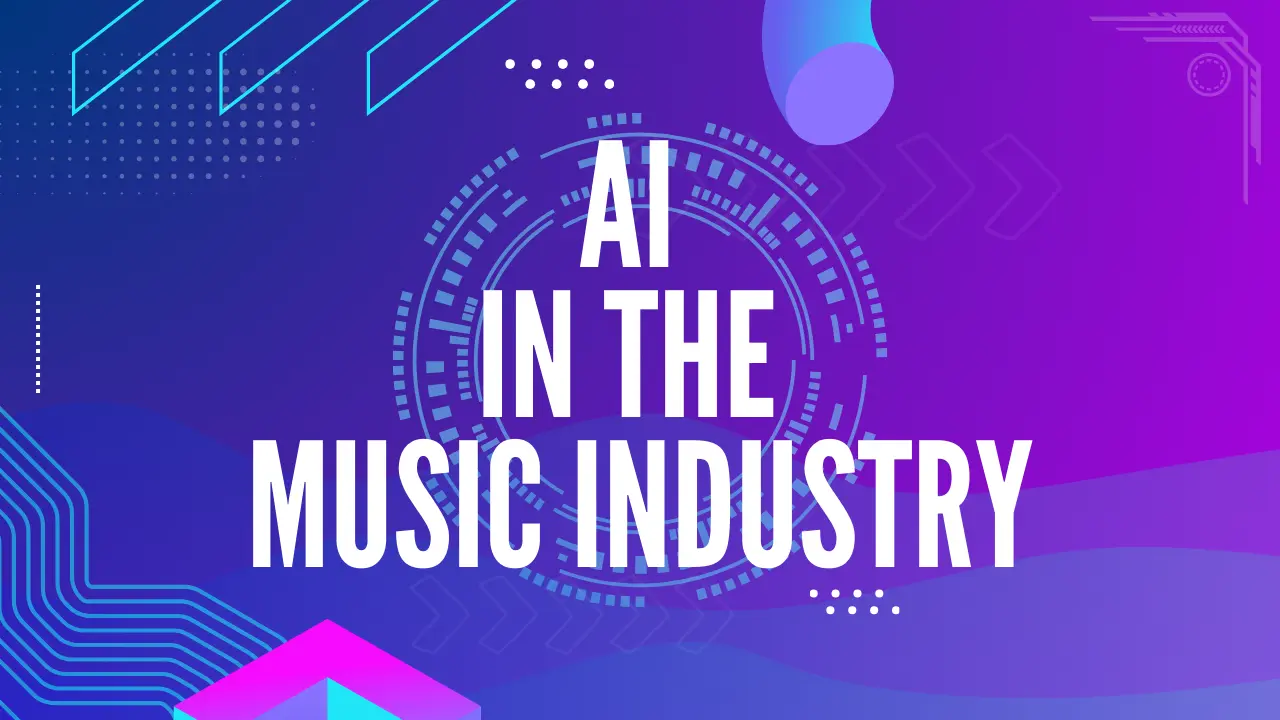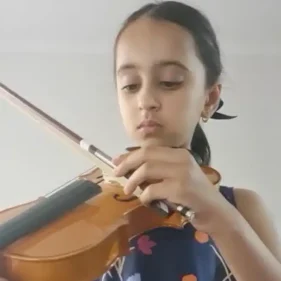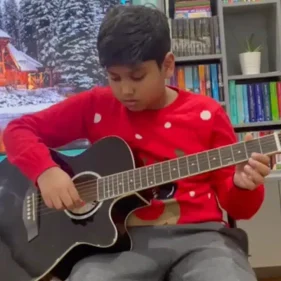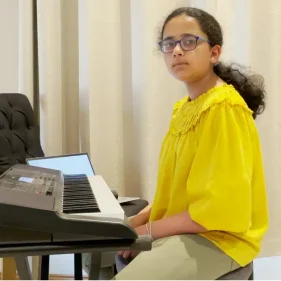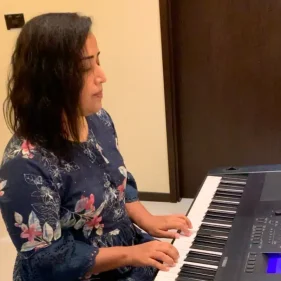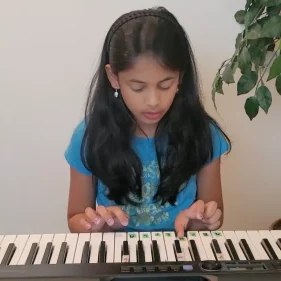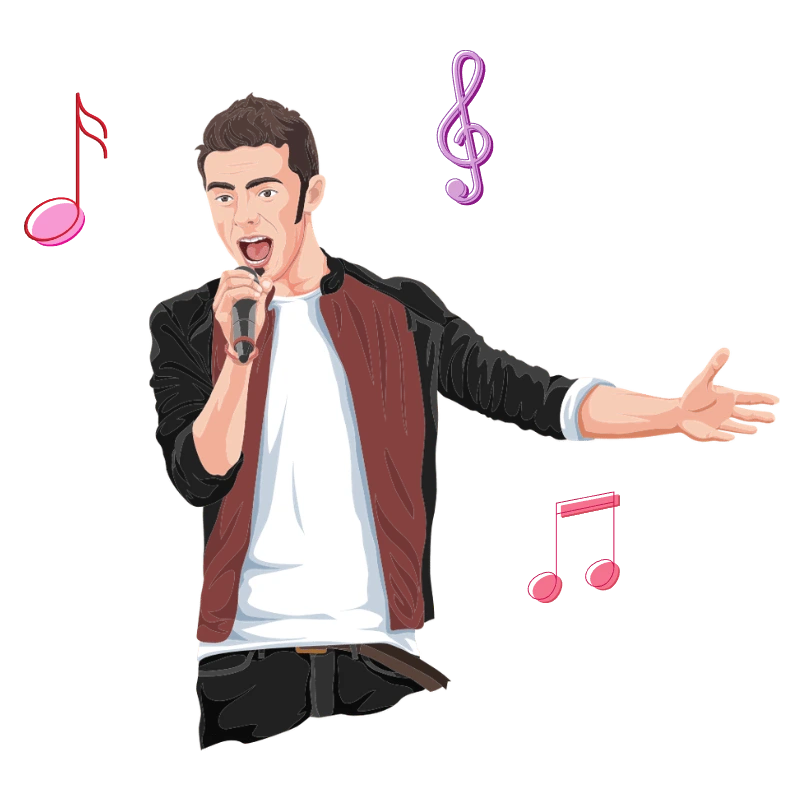You can’t exclude AI from your everyday dining table conversation. It has become prevalent in our day-to-day lives. It is an entrenched fact that AI Music Generation is real and that AI is going to be a revolution in all industries.
Having said that, every industry swiftly adopts AI in its processes or services. Likewise, the Music industry is also interested in joining with artificial intelligence. Recently, you might have heard some audio of Modi Ji singing famous songs that are not true or real. But this has been made possible using AI.

We need to constantly be open to new ideas and approaches, such as artificial intelligence (AI), and be willing to challenge assumptions.
AI at What Cost?
AI is becoming more than a foot technology in the music industry. To our surprise, AI is used to clone the voices of deceased singers like MSV, SPB, and many others. We embrace these innovations, and we are looking forward to seeing many more in the future, but the question is, “Does it come without any cost?”
Yes, every new change is entitled to pros and cons. So, the usage of AI in the music industry. Many argue that this intervention can kill creativity and even beat many established artists. Is AI really helping the music industry, or will it kill the creativity in this beautiful art? This article will deeply explore the possibilities and limitations of using AI in the music industry.
Integrating AI in Music
AI is an inevitable and most prominent technology that has emerged recently. As with any other industry, it is also revolutionizing the music industry. AI helps in music composition, enhances creativity, and uses less time.
The technology readily collaborates with artificial intelligence and human musicians and steers music production. Machine learning music composition lets AI systems scan massive volumes of musical data to understand genres and artists. More bluntly put, AI knows everything and everybody who is infamous in the music industry. So, it can effortlessly create delightful melodies, harmonies, and rhythms that match genres and artists by knowing their structures and styles.
AI – A Help or a Hindrance?
AI knowledge is massively helping many artists and technicians and saves their time. It boosts innovation, not replaces it. ML and AI open different opportunities for music enthusiasts, and they inspire composers and artists by suggesting new ideas and exploring diverse musical aspects. A human who embraces AI can be responsible for the revolution in the music industry that offers musical innovation and exploration.
A study conducted by the Beatles, “NOW and Then,” proves how AI plays a crucial role in music composition. It enhances the original audio by introducing new elements and layers into the existing composition. This is how AI help humans with the creative process and also produces music that reaches all audiences.
AI revolution is not going to cease anytime soon. It’s going to grow along with the addition of new elements integrating with music. The integration will excite both music composers and listeners. It will shape the future of music with AI and push the limits of music innovation. As AI technology advances, it steps into a new era of music creation, blending human artistry with machine precision to generate new realms of artistic expression.

Did You Know?
AI Music Platform Mubert Generated Over 100,000,000 Songs in the First Half of 2023.
The Impact of AI on the Music Industry
Of late, AI tools flocks into music production and streaming methods. It has brought sheer innovation to this field and the creators. It steered the way the music is produced, presented and consumed. The innovative AI technology open new limitless opportunities. Beyond the opportunities, it reduces the time taken to produce songs.
Many creators are now using AI-powered tools for mixing, mastering, and controlling professional tracks. Everyone is a hardcore fan of Janaki Amma’s voice, and we know there is no need to auto-tune her voice. But time changes, and the creator’s style changes. Shreya Gosha would have needed auto-tuning to make it more beautiful and artistic. Nevertheless, AI has made this simple and less time-consuming, but it does not compromise the vocal-tuning quality. The next biggest turn up is AI using all the music knowledge and arrange in the order it produces new music in a very less time.
AI Algorithms
AI algorithms are becoming cornerstone in live streaming platforms. They are extensively used to give a new level of experience to the audiences by crafting personlized playlists based on individual preferences, listening habits and moods.
These algorithms understand user preferences and recommend music suits their taste, thereby enhances the listener engagement. It also scrutinize the users taste on artists and suggest them same kind of artists and genres. We can’t just fully enjoy the pros of AI, while we are celebrating the nuances of technology it can suddenly break into a new problem. Yes, using of AI in music industry comes with the cost of copyright issues. This rise questions about originality and ownership of creative outputs.
AI – Mixed Feelings
As we discussed in the previous paragraphs, AI has profoundly impacted the music industry. But every creator has their stance about using AI in their music production. Some, like some, may not. But it doesn’t stop the wave it is about to bring into the music industry. Tools in AI music generation and prowess algorithms in streaming have brightened the industry’s future.
However, to sustain this progress in the fast-evolving music landscape, it is crucial to flag down the challenges and ethical issues, such as ensuring attribution and protecting intellectual property.
The Future of Music with AI for Education
As AI slowly takes over the music industry, it is high time for upcoming creators to learn how to work with AI technology. In this dynamic landscape, if you say, “I’m going to make music in old style without using AI, or I don’t want to adapt to new technology,” unfortunately, you still have many strides left before achieving success.
AI is greatly impacting music education. It is reshaping music education and equipping the next generation of musicians with tools that merge technology with creativity. AI music creation tools are changing the style of learning and creation processes in music classrooms by providing real-time feedback. This helps the students to understand their mistakes much faster and enhance creativity, and enabling music students to refine their skills. These AI music creation tools allows people to try out different style of music and delve into the technicalities of music through AI music composition. This will provide them new avenues for music exploration and understanding.
How Do People perceive AI in Music?
Not all music educators have same views about incorporating AI into music education. Many tech enthusiasts encourages the implications of AI in music education and some other educators don’t want this change to happen. Because they afraid of losing the traditional music skills and its techniques. Despite these concerns, AI music education enriches both teaching and learning by integrating cutting-edge technology with conversational methods. This integration of music into education explores new facets of musical creativity. It equips students with the skills needed in a tech-driven industry.
Among students also they have different opinions about learning AI along with the music. Some find AI techniques and tools enhances their creativity and allows them to rapidly prototype ideas and experiment with different genres. Others, however, place a higher value on the authenticity and emotional depth and connect of music created solely by humans, arguing that AI cannot replicate the unique personal touch of a human artist. Acknowledge the power of AI and using it in music represents a balance between embracing new technological advancements and also ensuring that the old form of music doesn’t vanish.
While leveraging AI capabilities is crucial, maintaining a strong emphasis on traditional music skills and human creativity is equally important. The future of music with AI in education lies in a symbiotic relationship where AI and human creativity complement each other, fostering an environment where innovation and tradition coexist.
The Controversial Rise of AI-Generated Music and Copyright Issues
The growing AI technology also brings in a lot of copyright and ownership issues in the music industry. This problem pulls a discourse around authenticity of the music. There are chances two or more people can get same answer from AI like two people can create same music without them knowing it. Because of these type of issues the industry faces crucial legal and moral questions as AI evolves to compass songs and replicate voices autonomously.
Music enthusiasts, artists, others put forth question like: Should Copyright law should be revised or evolved to cover AI-created music? Who legally owns the music generated using AI? What are the implications when AI uses copyrighted material without authorization? These issues are crucial for artists, composers, and the broader music industry, demanding thoughtful consideration and potential legislative actions.
Conclusion
AI’s influence on the music industry is profound. Many are hailing the integration of AI in music while some are feels apprehensive about this new venture. However, nothing can stop the infliction of technology in our life, profession or anything. The synergy between AI and human creativity has unlocked novel artistic possibilities and enhanced productivity.
Yet, this technological growth somehow causes copyright disputes, potential job losses, and concerns over diminished musical originality and emotional depth. As the music sector navigates these ethical and legal challenges, it also examines the advantages and constraints of AI, which will crucially influence its future trajectory.
While AI is taking over the market everywhere, there is one avenue where the AI has not been able to do much. That is teaching music
FAQs
Is AI capable of replacing human musicians?
AI is unlikely to fully replace human musicians. While it can aid in the process of music production. It can also compose music using algorithms that is feeded into it. But AI lacks the emotional capability and creativity of a human musicians. Thus it couldn’t bring emotional connect to the art. Human touch, Creativity, interpretation, and emotional expression in music are irreplaceable elements in music production.
Can AI generate truly original music?
AI can create music that sounds fresh, in a lesser time, equally good to humanly produced music, but its originality is debatable. AI-generated music is totally based on patterns and data learned from existing music. So, it can only produce music by doing permutations and combinations. It lacks the creativity to produce new music. Hence, it is more about recombining known elements in new ways rather than creating from a place of consciousness or emotional intent.
How does AI personalise the music experience for listeners?
AI personlizes user’s music experience by closely watching their music preference, behaviors and type of artists or genre they choose to hear. Live music streaming platforms will be benefited by this AI. It can use this technology to attract their user’s attention and bring in more subscription.
Is there an emotional deficit in AI-generated music compared to human-created compositions?
Many argue that AI-generated tasks lack ”Soul” or emotional resonance that music created by humans typically possesses. While AI can mimic styles and patterns, it doesn’t experience emotions, making its creation potentially feel less authentic or moving.
Will AI music creation tools increase the accessibility of music production?
AI music creation tools are making music production more accessible by lowering barriers to entry. They provide resources like auto-tuning, beat making, and sound mixing that can help novice musicians produce polished tracks without extensive technical expertise or expensive equipment.
What are the advantages of using AI music composition?
The benefits of using AI music composition include increased efficiency, the ability to experiment with complex algorithms and vast datasets, and the potential to generate new musical ideas quickly. AI can assist composers by suggesting variations, improving workflows, and handling some of the more labour-intensive parts of the music creation process.
Related blog: Must have music gadgets

